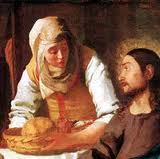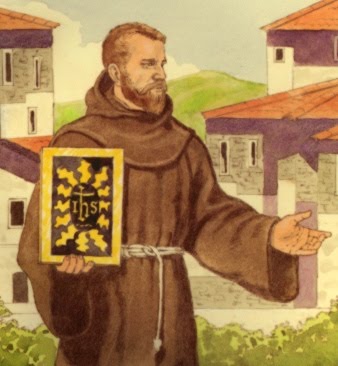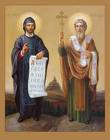 As Catholics, we try to balance in our lives of faith the active Martha and the contemplative Mary. Sometimes in the process Martha gets a bad rap. She’s anxious and worried about many things (Luke 10:41), so at times we might picture her as a frantic busybody flitting about, doing 101 things, while the serene Mary sits at the feet of Jesus.
As Catholics, we try to balance in our lives of faith the active Martha and the contemplative Mary. Sometimes in the process Martha gets a bad rap. She’s anxious and worried about many things (Luke 10:41), so at times we might picture her as a frantic busybody flitting about, doing 101 things, while the serene Mary sits at the feet of Jesus.
But today is the feast of Saint Martha. She is a full-fledged saint, with all the rights and privileges that go with it! While activism without prayer can quickly turn into mere workaholism; prayer without active apostolate also lacks authenticity.
At this exciting time in the Church, priests, religious, and laity are called to roll up our sleeves and actively participate in the great work of the new evangelization. There’s plenty to do to keep all of us Martha’s busy.
May we imitate the faith of St. Martha, who said, “I have come to believe that you are the Messiah, the Son of God” (John 11:27). And, like St. Martha, may we express this faith in active works of charity.
As we do so, we must keep in mind the clear teaching of Scripture. Our Lord said that Mary chose the better part, the one necessary thing (Luke 10:42). Our Lord is truly present at every Mass and in every tabernacle throughout the world. If we truly desire to be saints, to become the holy men and women God calls us to be, we do well–frequently and with much love and devotion–to return to the Source: Jesus, Our Eucharistic Lord.
I think St. Martha would wholeheartedly agree.
 Today is the feast of St. Lawrence of Brindisi. When reference is made to a “St. Lawrence,” however, we usually think of the third-century deacon and martyr who is even mentioned in the Roman Canon (Eucharistic Prayer I). This latter St. Lawrence, given his special patronage of those who barbecue, is indeed a fine summertime saint in his own right, but his feast isn’t till next month.
Today is the feast of St. Lawrence of Brindisi. When reference is made to a “St. Lawrence,” however, we usually think of the third-century deacon and martyr who is even mentioned in the Roman Canon (Eucharistic Prayer I). This latter St. Lawrence, given his special patronage of those who barbecue, is indeed a fine summertime saint in his own right, but his feast isn’t till next month. Today the Church celebrates the feast day of St. Bernardine of Siena. As a child in Southern California, I never heard about St. Bernardine, though the nearby city of San Bernardino (my brother called it “San Ber-doo”) was named after him. I only later learned that this 15th-century Franciscan priest was quite a dynamic evangelist and preacher.
Today the Church celebrates the feast day of St. Bernardine of Siena. As a child in Southern California, I never heard about St. Bernardine, though the nearby city of San Bernardino (my brother called it “San Ber-doo”) was named after him. I only later learned that this 15th-century Franciscan priest was quite a dynamic evangelist and preacher. Very few of us will walk up to someone today and greet him or her with the words, “Happy St. Cyril’s Day,” or even “Happy Cyril’s Day.” And surely no one will tell their sweetheart to “Be my Methodius.”
Very few of us will walk up to someone today and greet him or her with the words, “Happy St. Cyril’s Day,” or even “Happy Cyril’s Day.” And surely no one will tell their sweetheart to “Be my Methodius.”